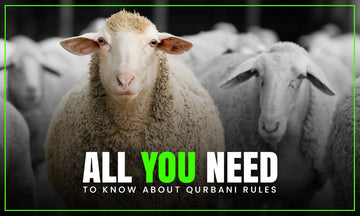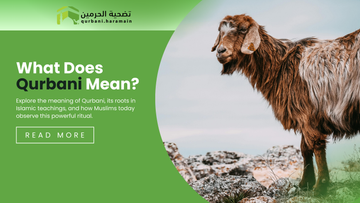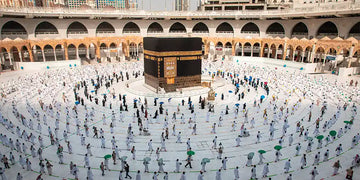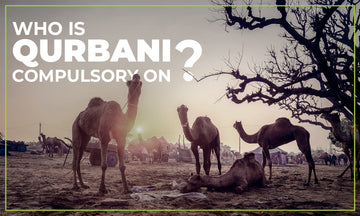What is Qurbani?
On the three days of Eid-Al-Adha, the annual sacrifice of animals, also known as Qurbani. It is performed to mark the completion of Hajj. This offering is made in memory of the action that Prophet Ibrahim (AS) took when he realized in a dream that Allah wanted him to sacrifice his beloved son Ismail (AS). However, Allah sent down a ram from heaven in Ismail's place as a test in the dream for sacrification.
By sacrificing an animal each year, we are assuring that we are willing to sacrifice whatever Allah demands of us and submit to Him thoroughly.
What are the Qurbani rules?
Who ought to offer Qurbani? When do we propose our sacrifice? Are there any other things we require to take into concern?
Worry not! We have put together everything you require to know about this holy sacrifice.
Who must perform Qurbani?
Every Muslim must execute Qurbani. The only oddities are as follows:
- Those who do not own the Nisab value
- Those not of sound sense
- Those who have not yet achieved and passed puberty
- Those who are traveling and are more than the distance from residence (around 40-45 kilometers)
You are allowed to grant Qurbani on behalf of further people, including those who have died; however, you are not anticipated to deliver Qurbani animals on behalf of your grown-up children, who can disburse their share.
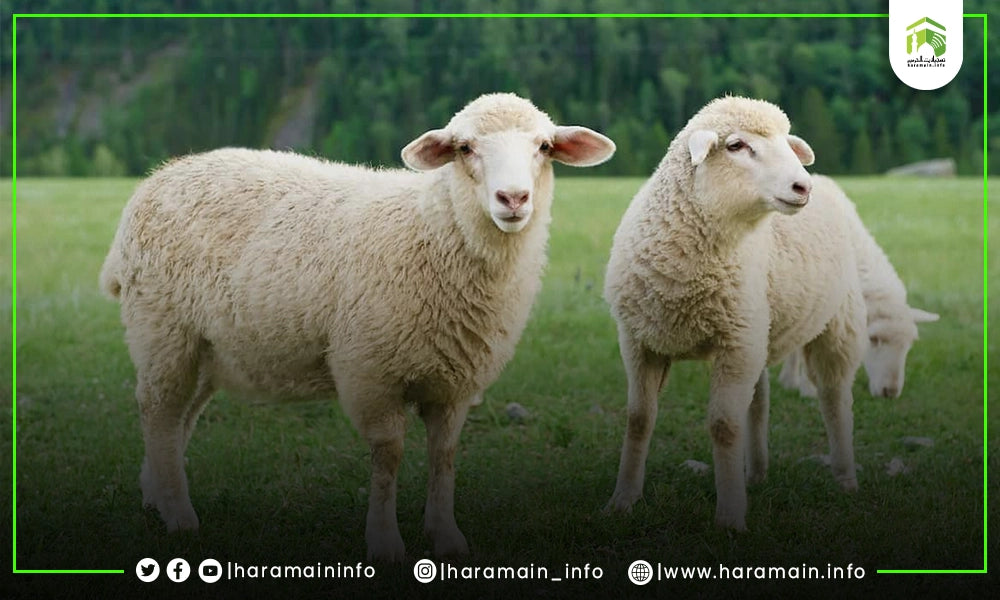
When do the Qurbani sacrifices take place?
Qurbani is done on the 10th, 11th, or 12th days of Dhul-Hijjah, the duration of the celebration of Eid ul-Adha. Eid ul-Adha, also called the Greater Eid, Bakra Eid, and Qurbani Eid. The first day of Eid al-Adha this year will be on the 27th or 28th of June 2023 (pendant on the sighting of the moon).
It is recommended that the Qurbani be performed as near as possible to the completion of Eid Salah, but not before that. Any sacrifice completed before the Eid prayer is considered a Sadaqah, not a mandatory Qurbani. If you do this, you must still conduct the Qurbani sacrifice after the Eid prayer.
At what age is Qurbani Fardh?
There are a variety of philosophies on the subject of whether or not Qurbani is needed. However, the sacred act of Qurbani is rewarding highly for the benefit of the less fortunate and is recommended for anyone over the age of puberty who possesses wealth above the nisab threshold.
Who can receive Qurbani meat?
In three parts, the meat from Qurbani animals should be divided equally. It ought to be given to the family, companions, and poor people (Muslim and non-Muslim the same). When performing Qurbani with a partner or partners, the meat should be divided according to weight, not by approximation. However, you cannot pay the butcher for animal meat, fat, or byproducts.
Which Animals can be sacrificed?
The animals which are suitable should meet minimum needs, such as the age of the animal for Qurbani and their situation, including:
- Sheep and goats younger than one year (enough for one individual Qurbani),
- Cows or buffalo younger than two years (enough for seven Qurbani shares)
- Camels younger than five years (enough for seven Qurbani shares).
In addition, all animals must be nutritious and free of illness, including the following situations:
- They should not be visually impaired, one-eyed toward, or have lost a third or a more of their sight
- They can not be feeling the loss of a third a more of their ear or tail, either through misfortune or since birth
- Their horn(s) can not be broken from their root
- They should not have a faltering leg that is adequately feeble that they can not stroll on it
- They can not be unreasonably skinny or lean
- They should have the option to walk themselves to the site of the butcher
- They can not be innocuous or missing over a portion of their teeth
- There is no inclination between male or female Qurbani animals
Should I avoid cutting my nails and hair if I am giving Qurbani?
There are contrasts of suppositions on whether it is unlawful to trim your nails and hair or whether it is despised. According to the Hanbali madhab and many scholars, refraining from cutting your hair and nails when donating Qurbani is required.
How should Qurbani Animals be sacrificed?
To satisfy the principles of the Qurbani, slaughterers and butcher houses ought to keep the accompanying guidelines:
- It is best to kill the animal with a sharp knife so as not to cause excessive despair.
- It is not advisable to sharpen the knife on the animal's face.
- Animals should not be killed in the presence of other animals.
Ideally, you should slaughter the animal yourself, but if you do not know how to slaughtered it, watch as someone else sacrifices it. When the animal is slaughtered, it is also necessary to recite Bismillahi Allahu Akbar. It is forbidden to skin slaughtered animals until they are cold.
How many animals do I have to sacrifice?
In the Hanafi madhab, every Muslim who has the financial means to do so is required to make a Qurbani donation, and many scholars recommend it. One Qurbani share is equivalent to one sheep and a goat or one-seventh of a cow, buffalo, or camel.
It is reasonable to give more than one portion of Qurbani? Would it be a good idea for you to wish to do as such? You can donate us to one Qurbani in Makkah and one in another country. The Prophet (peace be upon him) completed different Qurbani for himself and the Ummah. As a result, numerous Muslims perform multiple Qurbani in memory of their deceased parents and the Prophet (peace be upon him).
How many Qurbani Per family?
Every competent Muslim ought to be able to deliver at least one Qurbani, which is divided into three portions. A small animal like a sheep or goat is one share of Qurbani. Big animals like camels, cows, and bison can count for up to seven Qurbani shares. The rules of Qurbani say that a husband and wife can give the animal to each other, but the animal has to be big enough for everyone to give their share. Although it is not required, households frequently donate a larger animal that is worth seven shares.
What is a Prophetic Qurbani?
‘The Prophet (peace be upon him ) sacrificed for the one who could not offer from his Ummah, one who paid observer to the Oneness of Allah and [his] Prophethood’. [Tabarani and Ahmad]
After fulfilling his commitment, the Prophet (peace be upon him) gave an extra Qurbani in the name of the Muslims who could not afford to accomplish so. We promote all of our contributors to revitalize this overlooked Sunnah and support more needy individuals.
Qurbani is a spiritual act that gives a chance to get closer to Allah! On our blog, you can learn more about the history of Qurbani and the reasons why we perform this annual sacrifice.
We desire to have addressed every one of your inquiries, remember, assuming you have any further inquiries, kindly do not hold back and contact us.

